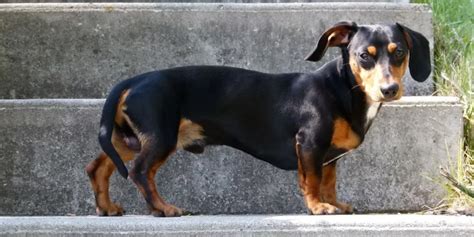Introduction

Dachshunds, fondly known as “wiener dogs” or “sausage dogs,” are beloved for their charming personalities and distinctive long, low bodies. However, this unique physique can predispose them to a serious health issue: back problems.
Prevalence and Significance
Intervertebral disk disease (IVDD) is a common and potentially debilitating condition affecting Dachshunds. According to the American Kennel Club (AKC), IVDD occurs in approximately 10-25% of Dachshunds, making it a significant concern for owners.
Causes and Risk Factors
IVDD occurs when the soft, gelatinous disks between the vertebrae in the spine herniate or rupture. This can be caused by:
- Trauma or injury
- Obesity
- Excessive activity
- Jumping or climbing
- Small stature and long body
Symptoms of IVDD
The symptoms of IVDD can range from mild to severe, and can include:
- Back pain
- Neck pain
- Stiffness
- Difficulty walking or standing
- Urinary or fecal incontinence
- Paralysis
Diagnosis and Treatment
Dachshund back problems can be diagnosed through physical examination, X-rays, and magnetic resonance imaging (MRI). Treatment options depend on the severity of the condition and may include:
- Medications
- Rest and crate confinement
- Physical therapy
- Surgery
Prevention of Back Problems
Preventing Dachshund back problems is crucial for their well-being. Owners can take several proactive measures, including:
- Maintaining a healthy weight
- Restricting jumping or climbing
- Providing a soft and supportive bed
- Using a harness instead of a collar
- Seeking veterinary advice on appropriate exercise and activity levels
Caring for a Dachshund with Back Problems
If your Dachshund has been diagnosed with a back problem, it is essential to provide appropriate care to manage their pain and prevent further injury. This includes:
- Strict rest and crate confinement
- Pain management medications
- Regular vet checkups
- Physical therapy as recommended by the veterinarian
Conclusion
Dachshund back problems are a serious concern, but with proper care and prevention, owners can help their beloved companions live long and healthy lives. By understanding the causes, symptoms, and treatment options, you can proactively protect your Dachshund from this debilitating condition.





















